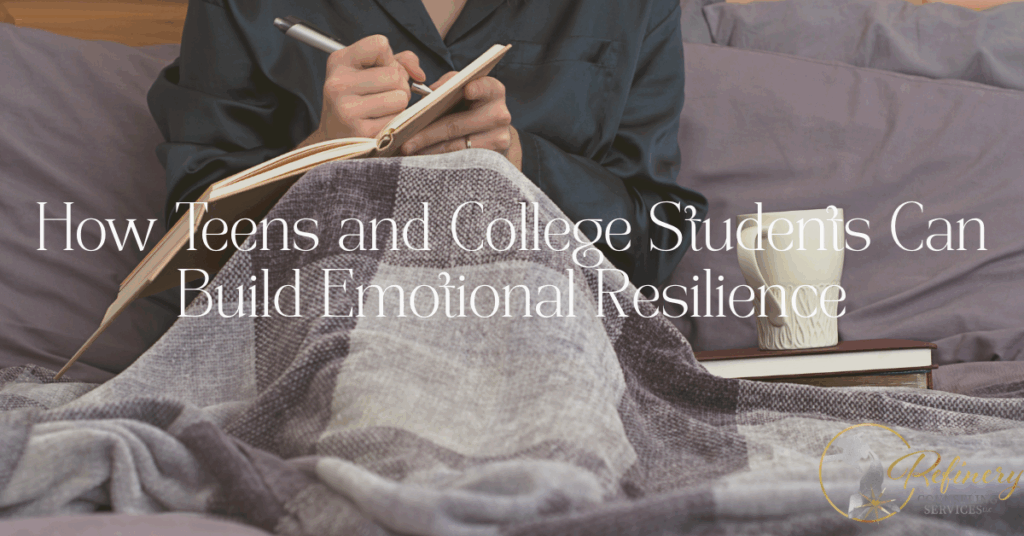Adolescence and early adulthood are full of transitions. Between academic pressures, identity development, social shifts, and the responsibilities that come with greater independence, many teens and college students find themselves overwhelmed. While emotional stress is common during these years, resilience is the key to navigating it well.
At Refinery Counseling Services, we walk alongside young people who are learning to manage anxiety, uncertainty, and change. This article explores practical and faith-integrated ways for teens and college students to build emotional resilience that carries them through every season.
What Is Emotional Resilience?
Emotional resilience is the ability to adapt to stress, challenges, and setbacks in a healthy way. It doesn’t mean you never struggle. It means you learn to recover, grow, and cope without losing your sense of self or purpose.
Resilience helps young people:
- Stay grounded during times of stress
- Navigate difficult emotions with self-awareness
- Build healthy relationships and boundaries
- Bounce back from disappointment or failure
And the good news? It can be learned.
Challenges Teens and College Students Face
Some common stressors include:
- Academic expectations
- Friendship changes or social conflict
- Mental health struggles like anxiety or depression
- Balancing faith, identity, and independence
- Fear of failure or future uncertainty
If not addressed, these challenges can lead to burnout, self-doubt, or isolation. But with the right tools, students can build endurance that strengthens emotional and spiritual well-being.
Core Practices for Building Resilience
- Name Your Emotions
Journaling, art, or simply talking with someone you trust can help you understand what you’re feeling and why. Avoiding emotions only makes them louder.
- Prioritize Rest and Rhythm
Sleep, nutrition, movement, and unplugged time all impact mental health. Students often sacrifice rest, but resilience requires margin. Reclaiming rest is essential—see Summer Burnout Is Real: How to Reclaim Rest and Joy for insight.
- Build a Support System
You don’t have to do it all alone. Invest in friends, mentors, and communities who encourage and challenge you. The Power of Connection: Why Building a Support System Matters for Men speaks to the universal importance of relational support.
- Practice Faith-Based Coping
Prayer, Scripture, and spiritual reflection can anchor your heart during stress. Verses like Isaiah 41:10 (“Do not fear, for I am with you”) can offer reassurance.
- Use Healthy Self-Talk
Challenge thoughts that say, “I’m failing” or “I’m not enough.” Replace them with truth: “I’m growing,” “I’m learning,” “I’m not alone.”
Recognizing When to Ask for Help
Resilience doesn’t mean pretending to be okay. It includes knowing when to:
- Talk to a counselor or therapist
- Set boundaries with toxic relationships
- Pause academic or extracurricular commitments
- Speak to a parent or trusted adult
How to Recognize Mental Health Symptoms Early — And What to Do Next helps students identify signs that may require additional support.
Faith and Emotional Growth
Young adulthood is a time of spiritual formation. It’s normal to wrestle with questions, doubts, and identity. Resilience includes being honest with God, engaging your faith community, and trusting that growth often happens in the tension.
Resilient students learn to:
- Anchor their identity in who God says they are
- Seek truth in Scripture and prayer, not just culture
- Accept grace when they make mistakes
Words of Encouragement for Students
If you’re struggling, take heart:
- You are not alone.
- Your emotions are valid.
- Progress isn’t always visible, but it’s real.
- Small steps matter.
- God sees your journey and walks with you.
Therapy Is Not Just for Crises: 5 Myths About Mental Health Support explains why seeking help is an act of strength, not weakness.
Practical Tools You Can Use Today
- Download a mood tracker or journal app
- Make a playlist that calms or inspires you
- Create a morning or evening prayer routine
- Reach out to a counselor or mentor
- Write down three things you’re proud of this week
Final Reflections
Building emotional resilience is not about avoiding struggle; it’s about learning to rise through it. Whether you’re a high school student adjusting to new responsibilities or a college student navigating independence, your emotional wellness matters. With time, tools, support, and faith, resilience becomes a steady companion through every season of life. You don’t have to have it all figured out. You just need the courage to keep showing up. One step at a time.

